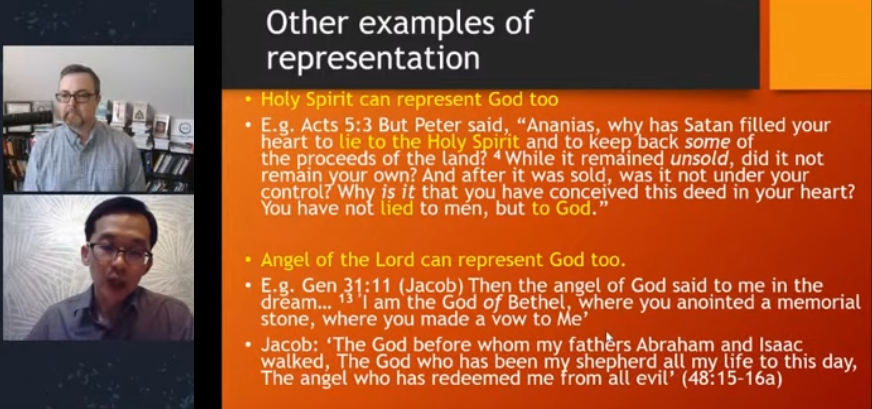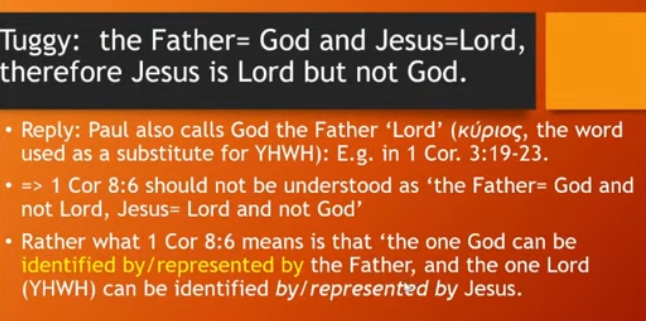Podcast: Play in new window | Download
Subscribe: Spotify | Email | RSS

My recent debate with Dr. Andrew Loke about the deity of Christ was courteous but content-rich. In this episode I follow up on some of those issues and arguments.
Topics include:
- How Dr. Loke follows some other two natures theorists in understanding Christ’s two natures to be concrete things and not mere properties.
- How this sort of two-natures theory is subject to serious too-many-sons problems, which is clear, for instance, in the case of the properties mortal and immortal.
- Whether or not the alleged Christ-creator texts straightforwardly imply the falsity of any sort of subordinationism.
- Dr. Loke’s suggestion that in the New Testament the Father is not one and the same with God, but rather, the Father “represents” God (as do Jesus and the Holy Spirit). I speculate on why he thinks this, and argue that the New Testament writings assume its falsity.
- When we can attribute a property of a proper part to its whole, and how this applies when it comes to the essential attributes of immortality and uncreatedness.
- Concerns about the christological mistake called docetism.
- Why I’ve not argued that there is only on “God” in the New Testament or only one “Lord” there, although I do observe that there is a unique god and a unique lord there.
- Why I think it is a mistake to think that the kind of knowledge enjoyed by a perfect being would be merely knowing all truths, and how this affects Dr. Loke’s krypsis model of two-natures theory.
- Why it is important evidence that the New Testament authors never warn us against inferring that Jesus is limited in power, knowledge, or goodness.
- Some disagreements Dr. Loke and I seemed to have about what I think are one essential divine attribute and one essential human attribute.
- Finally, I compare what Dr. Loke says about Jesus’s seeming denial that he is “good” in Mark 10 with what is said about that passage by Thomas Emlyn in his famous short book An Humble Inquiry.
What did you learn from this debate? What did you think were tho most interesting exchanges?

Links for this episode:
podcast 340 – Does the New Testament teach that Jesus is truly divine? – Loke vs. Tuggy – Part 2
podcast 339 – Does the New Testament teach that Jesus is truly divine? – Loke vs. Tuggy – Part 1
1 Corinthians 8:4-6; John 20:24-29; John 17:1-3; Ephesians 4:4-6; Deuteronomy 6:4; John 8:54; Mark 1:1; 1 Corinthians 1:9; 2 Corinthians 1:19; Ephesians 4:13; 2 John 3; John 6:45; John 8:41; John 13:3; Acts 2:33; Ephesians 1:17; Colossians 1:3; James 1:27; James 3:9; 2 John 9; 2 Corinthians 1:2-4; Psalm 11:1, Acts 2:33-35; John 17:5, John 5:26; John 6:68; John 17:8; Mark 13:32; Mark 10:17-22.
podcast 259 – Who is the one Creator? – Part 2
podcast 258 – Who is the one Creator? – Part 1
John 20:28 – Did Thomas Confess that Jesus IS God?
God and his Son – the logic of the New Testament
Reading comprehension quiz: Johann 17:1-3
podcast 225 – Biblical Words for God and for his Son Part 2 – Old “Lord” vs. New “Lord”
podcast 224 – Biblical Words for God and for his Son Part 1 – God and “God” in the Bible
podcast 248 – How Trinity theories conflict with the Bible
podcast 77 – Mr. Chad McIntosh on the Trinity
podcast 76 – Justin Martyr’s Dialogue with Trypho – Part 3
podcast 75 – Justin Martyr’s Dialogue with Trypho – Part 2
podcast 74 – Justin Martyr’s Dialogue with Trypho – Part 1
podcast 189 – The unfinished business of the Reformation
podcast 334 – “Who do you say I am?”
podcast 332 – Emlyn’s Humble Inquiry
Emlyn’s An Humble Inquiry @ Amazon
Bock and Loke on Jesus’s “blasphemy” in Mark 14 – Part 1
Bock and Loke on Jesus’s “blasphemy” in Mark 14 – Part 2
Dr. Loke’s reply to the two above posts (last 3 pages)
Clarifying Catholic Christologies
podcast 145 – ‘Tis Mystery All: the Immortal dies!
This week’s thinking music is “Underclocked (underunderclocked mix)” by Eric Skiff.

